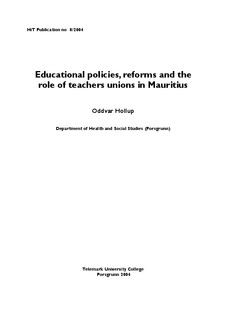Educational policies, reforms and the role of teachers unions in Mauritius
Research report
Published version
Permanent lenke
http://hdl.handle.net/11250/2439162Utgivelsesdato
2004Metadata
Vis full innførselSamlinger
- HiT skrift [62]
Sammendrag
This study has basically two major concerns; - describe and assess the role of the Teachers Unions, in particular the Government Teachers Union (GTU), regarding their conditions of service and their impact on educational policies and reforms. The report gives an outline of the educational system in Mauritius and its socio-cultural background, before it sets out to discuss the role of the most important trade union (GTU) within the primary education sector. Although Mauritius has achieved commendable success in providing universal access to basic education through very high enrolment rates and gender equality in education at primary and secondary level through its well-established education system, many sources of educational inequalities exist regarding educational inputs, processes and outcomes, and when meeting basic learning needs and assuring minimum level of competencies for all. The performance in learning cannot be properly understood unless taking into account the difficult and complex language situation that exists in Mauritius. It should be noted that for the great majority of the children, the language of learning and teaching was not their mother tongue. This is related to the fact that most children speak Kreol, a lingua franca, which is not a written language, while most teaching and learning is related to two ‘foreign languages’ such as French and English. There is also a good number of children in rural areas whose mother tongue is Hindi or rather Bhojpuri, an oral dialect of the former, who may be disadvantaged towards the means of instruction in primary schools that would influence learning achievements. One can just imagine what sort of difficulties these children encounter when faced with the challenge of learning two ‘foreign’ languages as from the age of five when they commence primary school. Another important findings which is far from new knowledge is that socio-economic status of the child’s family has a very strong impact on achievement at school. This confirm that parental education level and parents’ opinion about education are decisive factors affecting performance of the children at school.
